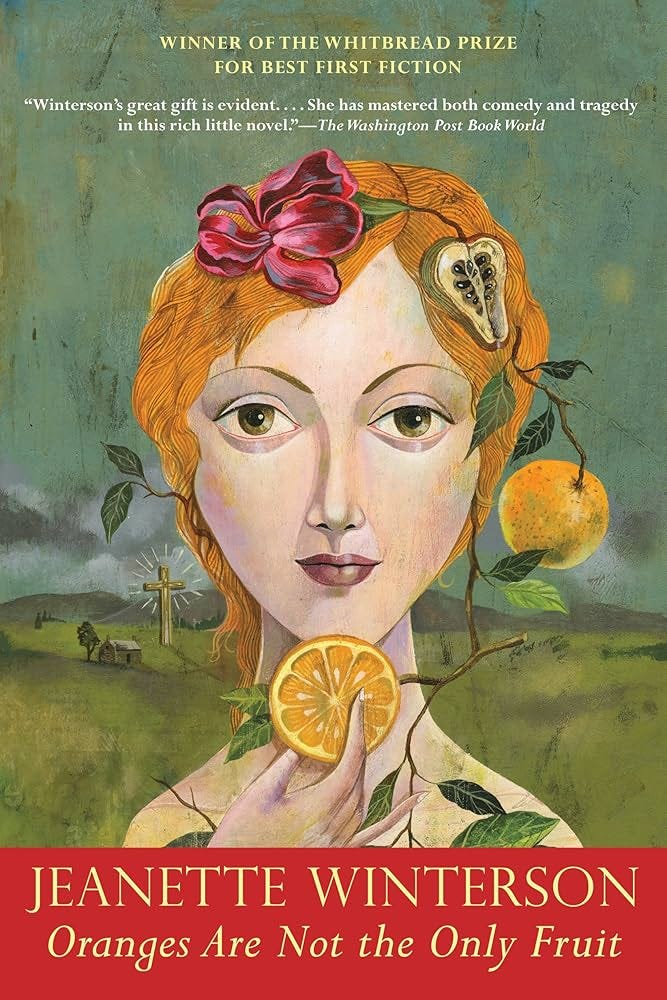What I Learned from Jeanette Winterson About Writing Fiction
Part Two of a Three-Part Series on What I Learned in my MA
Hello! How are you? Well, I hope. It was a whirlwind week and a half for me while my sister was visiting. It was her first time in the UK and I showed her as much of it as I was able.
We explored my little corner of the country, down in West Sussex, walking the beaches and marshlands and exploring Chichester, which is a lovely city.
FYI—I still have some room at my writer’s retreat here in West Sussex, Nov. 19-23.
Then we got a train to Scotland and spent a parts of two days exploring Edinburgh. One afternoon we toured the National Mining Museum in Newtongrange to learn about the lives of our ancestors. And we took a day trip to Loch Lomond and Stirling to see part of the gorgeous land they had to leave behind in order to find a better life.
Back in the South, we took day trips to London, exploring historic pubs, enjoying an indulgent afternoon tea, taking a river cruise on the Thames, wandering Westminster and St. James Park, and peeking through the gates at Buckingham Palace.
Now I’m back home and feeling a bit stunned by the quiet stillness of the house. But also I’m just really tired.
These letters are free for all. Sign up so you won’t miss a post.
Upgrade to paid membership if you’d like to support the growth of this community. More content for members and ways to connect coming soon!
Today, as promised, I want to share with you more of what I learned during my Masters in Creative Writing at the University of Manchester.
In my last letter, I talked about having discovered that writing is a lot like life and I quoted Rachel Cusk:
Essentially, I think all the problems of writing are problems of living. And all the problems of creativity are problems of living. They are problems we all share.
I wrote that last December, not yet realizing how much more true that would become in my second semester.
In January, I moved to Manchester, started having debilitating vertigo, and met Jeanette Winterson. (She is the author of Oranges Aren’t the Only Fruit and about thirty other books.)
The next eleven weeks were a very wild ride. I’ve written about my move and my vertigo and the healing I had to do. But I haven’t shared what I was learning in my course—because I knew it was A LOT, and I needed time to process it.
Besides, Jeanette is a force of nature, and there were times when I felt like I was getting run over by a truck—in a good way. My nervous system was a wreck, and I was having a lot of brain fog (as a result, I know now). But for the brief periods of time I was in her presence, I wanted to absorb as much as possible. I took crazy notes, scribbling down as much as I could.
What most surprised me after that first semester—when writing fiction felt like doing some kind of complex math equation—was that actually it didn’t have to be so complicated. Once your brain could switch on to the frequency (for lack of a better word) for writing fiction, then you just had to stay there as long as you could, before being dragged back into the blare of ordinary life.
Writing fiction is not a formula, in other words. It’s a state of mind.
So I decided to forget that long list of things I was supposed to be doing on each and every page and just focus on the lessons Jeanette was teaching me. What follows is my attempt to sum up a semester’s worth of meetings and advice. Sometimes I’ve copied the words from my notebook, which are close to what she actually said, but I couldn’t say these are direct quotes. These are set apart like quotes, though. The rest is my interpretation and extrapolation. Keep in mind, this is my filtering of Jeanette, not her directly.
Being Conscious
Know why you are doing what you are doing. Make conscious choices. Have a reason for everything. You will need to be able to defend your choices later to editors.
You should always be having a dialogue with yourself about what you are doing. Keep asking yourself, what’s working and what isn’t? Why am I doing this and not something else? What you will end up with is a method of self-questioning that will serve your work forever.
In other words, you should never be on autopilot. Or if you are because you are in the flow, then when you come back to edit, you should ask yourself, is this accomplishing what I want it to accomplish? Have I achieved the effect that I wanted to here?
Essentially, you need to become aware as much as possible of what you are doing, what works and what doesn’t, and why. Which leads to . . . .
Trusting Yourself
Stay away from how-to manuals. Find your own compass. Have this communion with yourself, this constant dialogue that helps you discover the writer that you are.
The mentorship you have should be with yourself and your favorite writers. You can (and should) learn simply by reading other writers. Read first for story, because that is what our minds do, but then read again to see how the author reveals character through setting, how they make dialogue effective, etc.
Use yourself as your own barometer for your writing. As you read through what you’ve written, ask yourself the basic questions:
Does it bore me?
Does it move me?
Have I written about the thing I need to write about?
Have I done it in the best way I can?
Jeanette also said that she doesn’t believe in writer’s block. Don’t panic when you feel stuck, she said. Any problem you hit upon is an invitation to find a better way. You stop writing because something isn’t working. Figure out what it is and why, and try something new.
Being Present
Everything is about the moment the story is in! Resist the urge to move out of the immediate present.
Character and the moment they are in are everything. Follow the character through their world. They must take us on a journey through their time and place. Don’t leave them behind to show us something else. Stay with them!
Backstory is only there for the story now. Only take us away from the present if it’s necessary for the present moment of the story. Readers must first be interested in the character before they will care about their backstory.
“No one cares that he’s an artist and was friends with Marcel Duchamp,” she said about one of my characters during workshop. “We don’t even know who he is yet and what he means to your protagonist.” I had tucked in a bit of explanation, and I could see how it took the reader out of the story. When I rewrote the scene, the fact that he was an artist came out more naturally, without my authorial aside.
Another time she said, see every situation as your character does—which may through the lens of the past or something that has happened to them before. Trust their perception of things, allow them to behave as they would, and don’t step in to explain things. This is their story.
This was something I really need to learn, coming from a writing background that is all about explaining things! The move from nonfiction to fiction is profound—and I think this method of staying present with your characters, inhabiting them and perceiving their world through their senses, erasing yourself essentially, is the imaginative leap you have to make to be a fiction writer. I asked her once, is it like Method Acting? And she said, Yes, exactly.
Another time she said, keep in the character’s world. Don’t try to be Tolstoy! Think about Austen and the Brontës—they didn’t bother with the Napoleonic Wars because it didn’t impact their characters.
Think of what setting and details you need to allow the character to reveal their story. Everything serves the character and their story, which leads to . . .
Simplify, simplify
Every story has a basic structure: Someone wants something. Obstacles arise. They either get what they want or really need (comedy) or they don’t (tragedy).
This is the pattern of story, how humans have always told stories. No need to get too complicated about it! You don’t need to drill down into beats as if you were writing a screenplay. Fiction has more give to it.
And don’t get too hung up on content. It’s this basic structure that makes a story emotional satisfying, which is essentially its basic function. We should exit a story in a different emotional state than we entered it.
And every good story is essentially focused on one main character and their desires.
You don’t need to know the hero’s journey. You just need to know what your characters want!
We care about them to the extent that we know what they want and can see them trying to get it. It doesn’t have to be anything elaborate. It’s the wanting itself that is creates the connection.
As for how to tell the story, ask yourself, what is the minimum amount of context (backstory, scene setting, etc.) my reader needs to connect to my character in this moment? Does the reader need to know this now? Less is more, she said over and over again. Select ruthlessly.
Avoid too much detail, which can make your story feel like the world’s worst travel book. Use quick, deft ways to capture a world.
Overwriting is a usually a symptom of under-confidence, she said. And boy did I have it! Under her guidance, I found myself writing leaner and cutting out huge chunks of explanatory things that I thought the reader needed.
And that pretty much sums up what I learned from Jeanette Winterson about writing fiction.
Lastly, I will leave with you one of the most comforting things Jeanette taught us:
Work with your strengths. You don’t have to master everything!
And this gem that I want to have calligraphed on my wall:
You’re not looking for perfection. You’re looking for life. So your characters can live and readers can care what happens to them.
Now let me know what you think of Jeanette’s advice. What has jumped out at you? Anything you disagree with? I’d love to know.
If you enjoyed this post, please click on the heart at the bottom or the top of this email/post. It helps others discover Audacious Women, Creative Lives.
If you love receiving my letters, you can upgrade your membership to support this growing community. I have many new plans for us in the coming year!
And once more, you can learn more about my “Come and Write by the Beach” retreat, Nov. 19-23, here.
‘I write entirely to find out what I’m thinking, what I’m looking at, what I see and what it means. What I want and what I fear.’
—Joan Didion








I'm only in the very beginning of this writing path and this has been the most helpful and inspiring advice I've ever had! Thank you!
Thanks you for sharing her writing advice. I've always loved her books and was curious what it would be like to meet her.